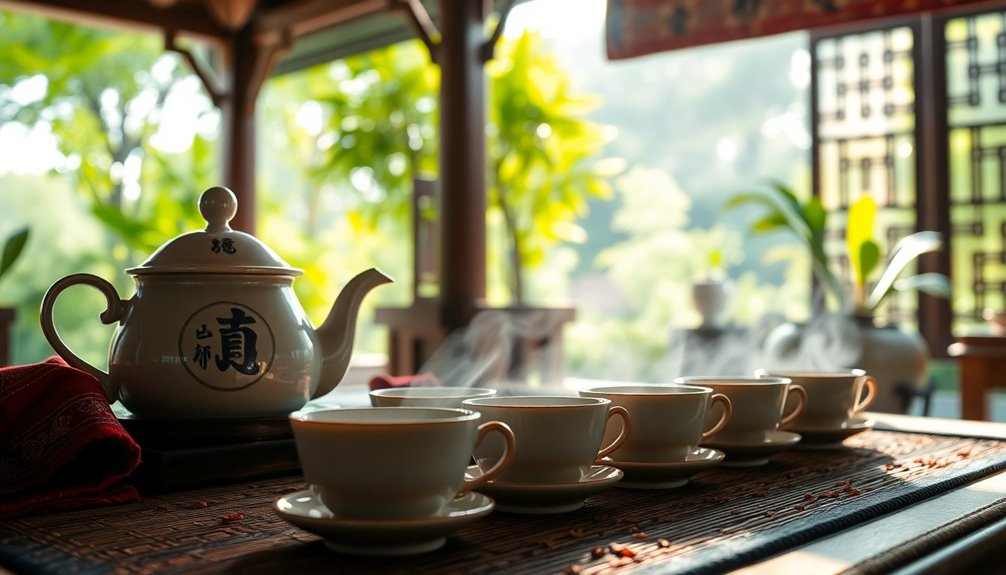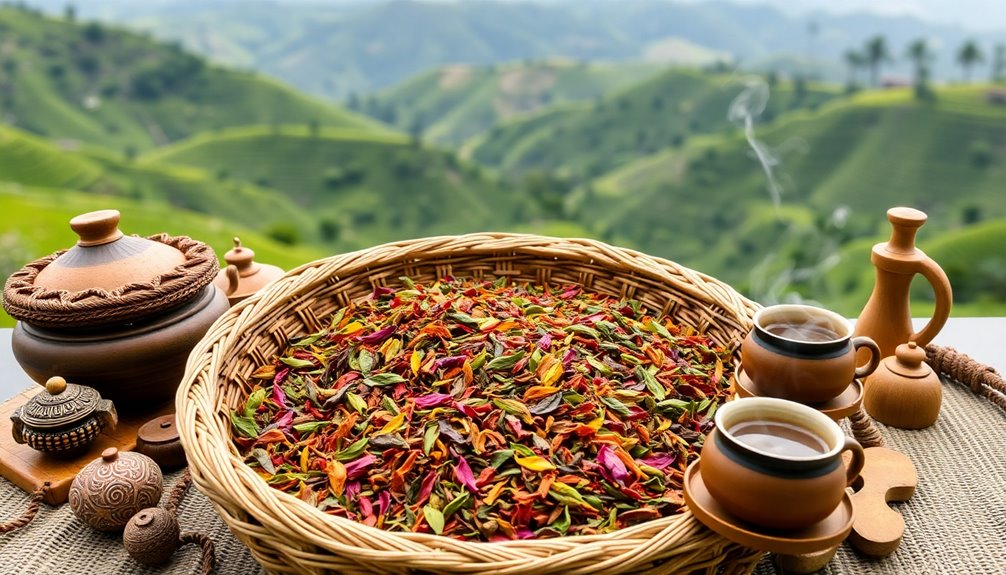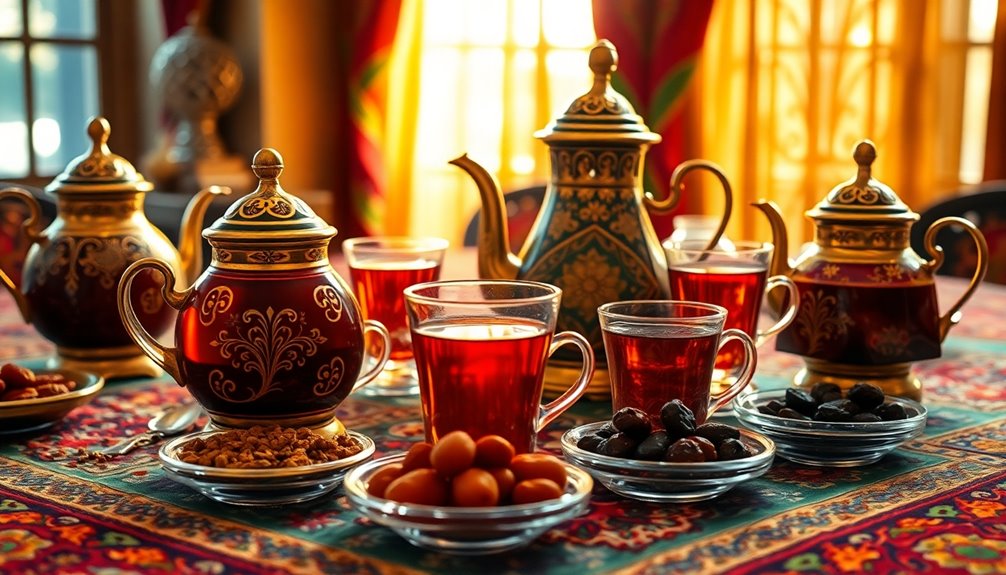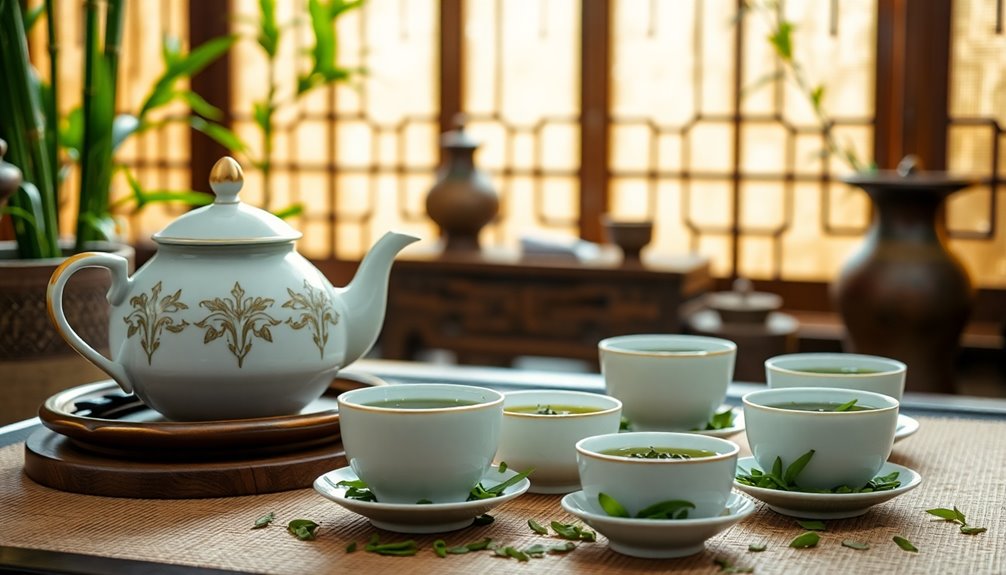Tea traditions around the world show how hospitality can bring people together. In Morocco, refusing mint tea is seen as rude. In Argentina, sharing yerba mate creates a sense of community. Japan's tea ceremony emphasizes mindfulness and respect, while British afternoon tea invites laughter and conversation. Turkish çay is a warm welcome, and Russian samovar tea encourages connection among friends. Each tradition highlights how a simple cup of tea can create bonds and foster understanding. So, when you think of tea, remember its power to invite and connect people from all walks of life. You might discover even more fascinating traditions!
Key Takeaways
- Moroccan mint tea rituals symbolize hospitality, where refusal to partake is seen as impolite, fostering community connections.
- The Japanese tea ceremony emphasizes mindfulness and respect, creating serene social interactions among participants.
- Sharing yerba mate in Argentina encourages communal bonding and strengthens friendships through the act of passing the gourd.
- Turkish çay is a gesture of generosity, enhancing social ties and inviting relaxation and conversation among guests.
- Indian chai culture reflects warmth and hospitality, promoting connections through shared experiences and inviting conversations.
Introduction
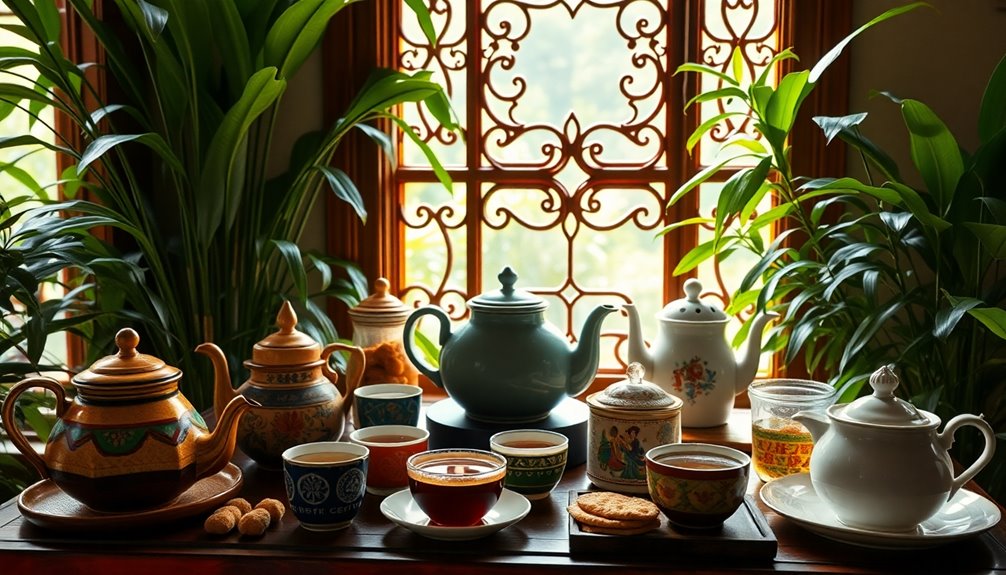
Tea is more than just a beverage; it's a bridge that connects cultures and fosters social bonds. When you sip a cup of tea, you're not only enjoying a drink; you're also participating in a rich cultural experience. Each region has its own traditions centered around tea, showcasing hospitality and warmth.
In Morocco, for instance, refusing a glass of mint tea can be seen as deeply offensive. This highlights how essential tea is to social gatherings in Moroccan culture.
Then there's the Japanese tea ceremony, or Chanoyu, which teaches mindfulness and respect, creating a peaceful atmosphere among friends.
In Argentina, sharing yerba mate brings people closer together. This communal tea drinking ritual emphasizes friendship and connection.
Similarly, in Russia, the samovar symbolizes hospitality. Offering tea to guests is a warm gesture that makes everyone feel welcome.
These tea traditions not only celebrate the drink itself but also the bonds we create through it.
Whether it's a formal ceremony or a casual gathering, tea truly is a universal connector that enriches our lives and makes every moment special.
Cultural Significance of Tea

Across various cultures, tea embodies a rich tapestry of meaning that extends beyond its role as a beverage.
Tea serves as a universal symbol of hospitality, especially in practices like Moroccan mint tea, where refusing tea can be seen as rude. This highlights how tea fosters social bonding and respect among people.
In Argentina, the yerba mate ritual encourages community connection as friends and family pass the gourd, sharing the experience together.
The Japanese tea ceremony, or Chanoyu, reflects cultural values like mindfulness and respect, reminding you to appreciate the moment.
British afternoon tea, a delightful culinary tradition from the 19th century, brings people together for conversations and laughter.
Lastly, the Chinese Gongfu tea ceremony showcases the art of tea preparation, emphasizing heritage and social etiquette, while inviting guests to savor the flavors and aromas.
Each of these traditions does more than just serve tea; they strengthen relationships and build connections.
Tea as a Social Connector
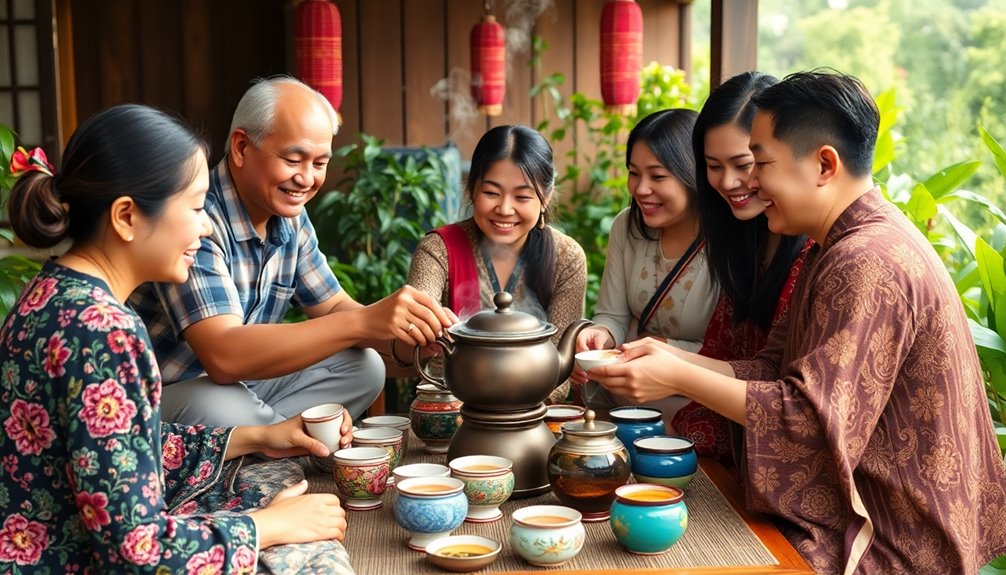
Cups of steaming tea often serve as the backdrop for meaningful conversations and connections. In many cultures, tea is considered a symbol of hospitality that brings people together.
For example, when you enjoy Moroccan mint tea, it's served alongside a ritual of three cups, each representing life, love, and death. This highlights tea's significant role in community bonding and encourages mindfulness practices that enhance social interactions. The act of sharing tea can also help reduce anxiety levels in social settings.
In Argentina, you'll find yerba mate being passed around in a gourd. This tradition encourages everyone to share, creating a warm atmosphere.
Similarly, the Japanese tea ceremony, or Chanoyu, focuses on mindfulness. Preparing and serving matcha fosters a serene environment for social engagement.
In Turkey, tea (Çay) is a part of daily life, enjoyed throughout the day in small tulip-shaped glasses, often accompanied by sweets. This practice promotes social interaction and hospitality.
Indian chai culture reflects warmth as spiced tea is frequently offered to guests, enhancing connections and reinforcing the importance of hospitality. Additionally, enjoying a cup of tea, whether it's herbal tea for relaxation or a stimulating yerba mate, can enhance the overall experience of connection.
Whether you're sipping tea with friends or family, these traditions remind us of the joy of tea drinking as a way to connect and celebrate together.
Tea as a Peace Offering
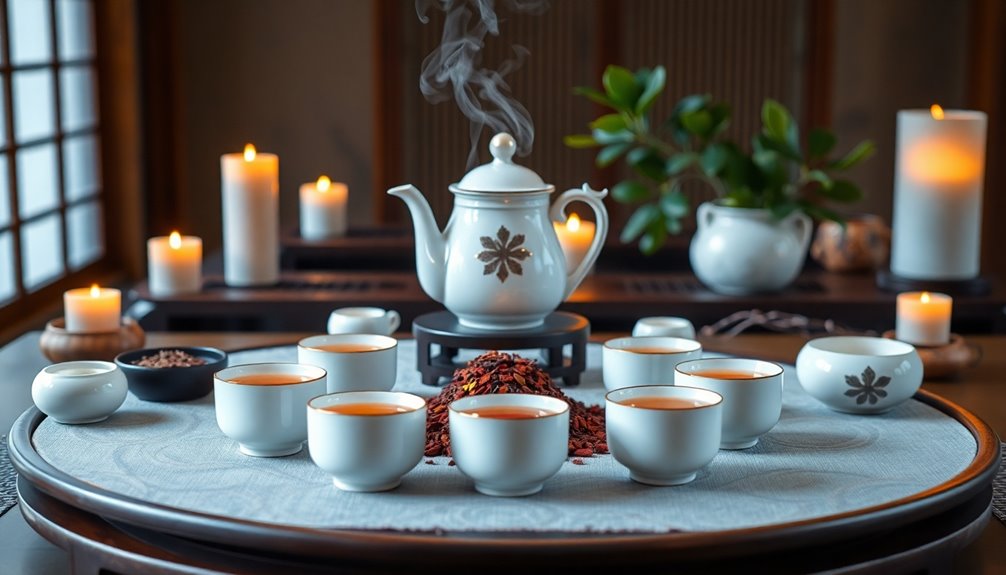
Similarly, in Turkey, çay is a common gesture of hospitality, showcasing the host's generosity.
And in Russia, tea from a samovar invites guests to relax and engage in conversation, reinforcing social ties.
These tea traditions remind us how a simple cup can bring people together, creating connections and fostering peace.
Cultural Appropriation in Tea Practices

While tea often serves as a symbol of hospitality and connection, it's important to recognize how cultural appropriation can complicate these traditions. When you enjoy a cup of tea, think about its origins. Many traditional tea ceremonies, like the Japanese tea ceremony or Moroccan mint tea rituals, carry deep cultural significance.
Adopting these practices without understanding their context can lead to misrepresented practices. The popularity of drinks like bubble tea and chai often brings commercialization that overshadows the meaningful social bonding found in cultures like Taiwan and India.
This can dilute the original values of hospitality and respect inherent to Turkish and Russian tea traditions. When tea traditions blend in modern cafes, you might find a version that doesn't honor the authentic practices.
To appreciate global tea traditions, it's vital to embrace awareness and education about their histories. By doing this, you can help preserve their cultural significance and foster respect for the diverse customs surrounding tea.
Practical Applications
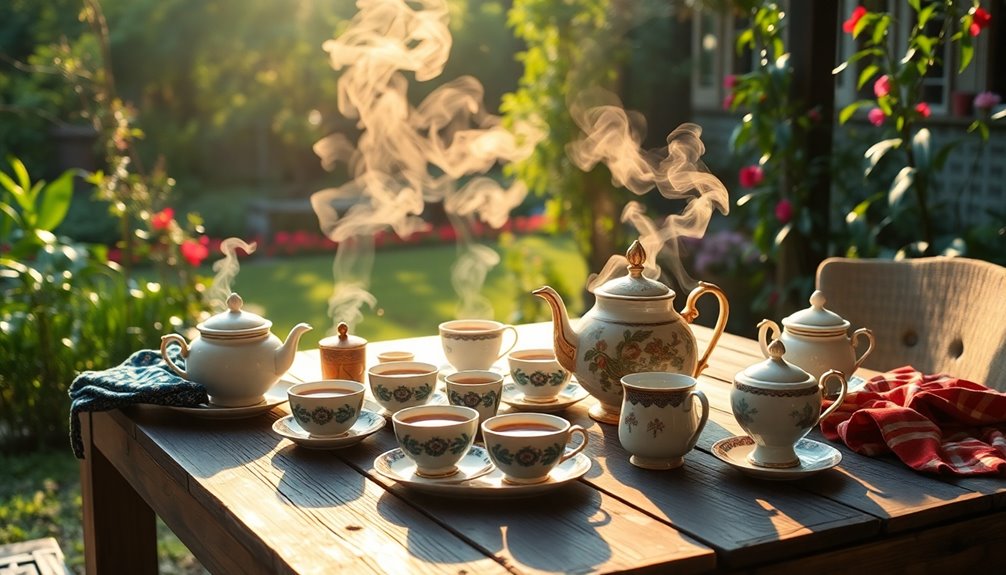
Embracing the rich traditions of tea in hospitality can enhance your gatherings and foster deeper connections. You can incorporate elements from various tea cultures to create a warm and inviting atmosphere for your guests.
For instance, try serving Moroccan mint tea, known as Atay, in three rounds. This not only symbolizes life, love, and death, but also encourages conversation and connection. Hibiscus tea, known for its vibrant flavor and health benefits, can also be a refreshing addition to your tea offerings.
Consider hosting a Japanese tea ceremony, or Chanoyu, where you focus on mindfulness and respect. Invite guests to enjoy matcha prepared with care, creating a serene experience that reflects tranquility.
Incorporate the Argentine yerba mate ritual to promote social bonding. Share the drink from a gourd among friends, fostering a communal experience that brings everyone together.
Don't forget about Turkish tea, served in small glasses alongside sweets, or Russian tea brewed in a samovar for lively conversations. These intricate rituals highlight hospitality and create memorable moments. Additionally, serving tea at the right water temperature not only enhances the flavor but also showcases your attention to detail and care for your guests.
Frequently Asked Questions
What Are Some of the Traditions Associated With High Tea?
When you enjoy high tea, you savor hearty dishes like shepherd's pie and quiches, often served around 5 PM. It's a casual gathering, emphasizing family and friends, contrasting with the elegance of afternoon tea.
How Is Tea Part of British Hospitality?
Tea's a cornerstone of British hospitality. You'll find it served with care, often in fine china, creating a warm atmosphere. Sharing tea invites conversation, making gatherings special and fostering connections among friends and family.
What Is the Cultural Significance of Tea?
Tea's cultural significance lies in its ability to connect people. When you share a cup, you're fostering community, expressing hospitality, and engaging in rituals that reflect deeper meanings of love, respect, and social bonding.
In What Ways Does the Tea Ceremony Represent the Attitudes of Its Culture?
The tea ceremony reflects your culture's values by emphasizing mindfulness, respect, and connection. Each step fosters tranquility and unity, inviting you to appreciate the present moment while deepening your relationships through shared experiences.
Conclusion
In conclusion, tea is more than just a drink; it's a bridge that connects cultures and people. Whether you're sharing a cup with friends or offering it as a peace gesture, tea brings joy and warmth to any gathering. Remember to respect the traditions behind tea, as they enrich our experiences. So, the next time you brew a pot, think about the stories and connections it can create. Enjoy your tea journey, and cheers to global hospitality!

